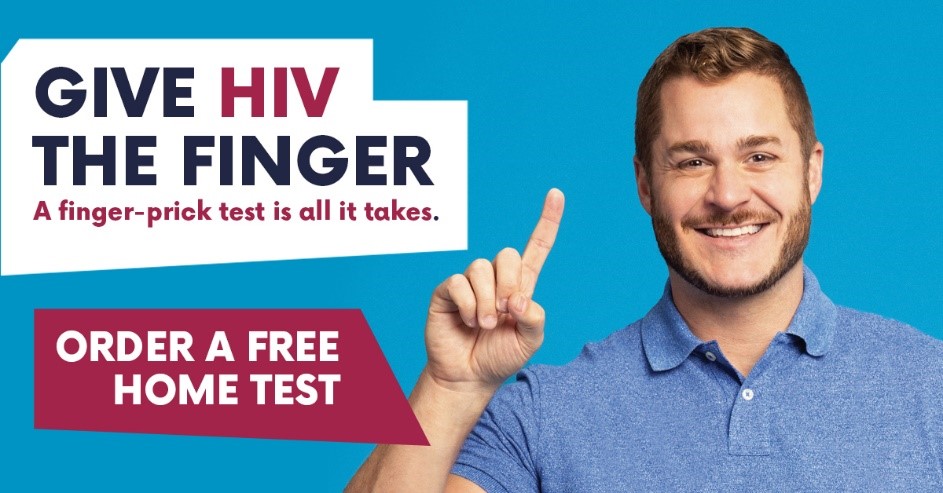Give HIV the finger
People across Shropshire are being urged to ‘Give HIV the finger’ and order a free home finger-prick testing kit.
The call out from Shropshire Council’s public health team is part of National HIV Testing Week this week (until Sunday 7 February 2021). Throughout February people can now order the free HIV postal test. The test is fast, confidential and simple.

Give HIV the finger
National HIV Testing Week aims to promote regular testing, which helps to reduce the number of people living with undiagnosed HIV and those diagnosed late.
Being diagnosed can ultimately saves lives, by allowing people to access vital treatment sooner and make lifestyle changes to stop the spread of the virus.
The main ways the HIV virus is transmitted is through unprotected sex, sharing needles while taking drugs, mother-to-child transmission during pregnancy, and coming into contact with contaminated blood.
This year, due to coronavirus, the campaign will have a strong focus on promoting HIV testing at home.

Give HIV the finger
Rachel Robinson, Shropshire Council’s director of public health, said:-
“HIV research and treatment has improved significantly but there is still no cure. People infected with HIV and who are taking treatment can live long, healthy lives, but early diagnosis is critical.
“National HIV Testing Week’s campaign aims to promote regular testing among the most affected population groups in England. This helps to reduce the number of people living with undiagnosed HIV and those diagnosed late.
“As most people get HIV from someone who doesn’t know they have it, if we all get to know our HIV status we can reduce the chances of this happening.
“Testing from home is the safest option during the current pandemic. The National HIV Testing Week is a great opportunity for you to get tested at home and encourage others to do the same. HIV testing is easier than ever: a finger-prick is all it takes.”
Sehra Mehta, Operational Manager, Shropshire Sexual Health Services, added:-
“Testing for HIV has never been quicker or easier. With the coronavirus pandemic, we’re encouraging people to find out their HIV status using at-home testing kits, which Shropshire residents aged 16+ can order from www.sh.uk. The most common way of getting HIV in the UK is by having sex without a condom – so if you’ve had unprotected sex it’s definitely worth getting a test, and what better time to test than National HIV Testing Week.”
To find out more and to order your home testing kit visit https://www.startswithme.org.uk/order-a-free-hiv-postal-test/.
Shropshire’s Sexual Health Service
Testing kits are available from www.sh.uk to people aged 16+ living in Shropshire. The kits can test for HIV, as well as other STIs like chlamydia gonorrhoea and syphilis. The test for HIV and syphilis is a self-taken fingerprick blood sample, and either a urine sample or vaginal swab for chlamydia or gonorrhoea.
You can also find out more about Sexual Health Services in Shropshire here: http://openclinic.org.uk/.
Further information
An estimated 13,500 people living with HIV in the UK are unaware they are infected, putting them at higher risk of poor health and passing the virus to others. Usually, the campaign takes place in November, but the 2020 HIV Testing Week was moved to February 2021 due to the coronavirus pandemic.
Who’s most at risk?
People who are at higher risk of becoming infected with HIV include:
- people with a current or previous partner with HIV
- people with a current or previous partner who is from an area with high HIV rates
- people who are from an area with high HIV rates
- people who engage in chemsex (using drugs to help or enhance sex) – chemsex among men who have sex with men is an increasing concern as it can be associated with risky sexual behaviours, such as having lots of different sexual partners and not using condoms
- men who have unprotected sex with men
- women who have unprotected sex with men who have sex with men
- people who inject drugs and share equipment
- people who have unprotected sex with somebody who has injected drugs and shared equipment
- people who share sex toys with someone infected with HIV
- people with a history of sexually transmitted infections, hepatitis B or hepatitis C
- people who have had multiple sexual partners
- people who have been raped (an assault involving penetration of the vagina, anus or mouth)
- people who have received a blood transfusion, transplant or other risk-prone procedures in countries which do not have strong screening for HIV
- healthcare workers who could accidentally prick themselves with an infected needle – but this risk is extremely low
- babies with mothers who have untreated HIV – before or during birth or by breastfeeding.
Find out more about HIV (human immunodeficiency virus) on the NHS website.

